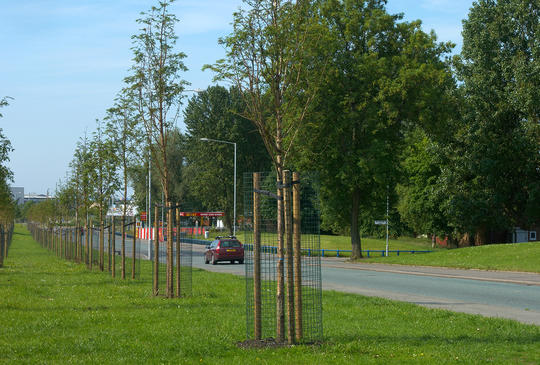
Greater Manchester to Gain Investor Confidence in Nature-Based Solutions
Contributed by Jennifer Lane
Green roofs, rain gardens and trees are all proven to be effective at slowing the harmful consequences of climate change, such as overheating in urban areas and flooding. Greater Manchester has not been immune to the effects of climate change. With the 2018 moorland fires and last year’s flooding in mind, we need nature-based solutions to help us adapt to climate change – but who is going to pay for them?
Most projects rely on the public sector, community groups and developers to deliver them – these are limited in scope and vulnerable to changes in the economic climate. Securing new investors to fund these projects is crucial, but making this happen brings many challenges.
Greater Manchester’s IGNITION project aims to address these challenges, giving would-be investors a solid case for investment to finance these innovative climate change solutions.
But what is the IGNITION project and how is it working to improve investor confidence?
What is the IGNITION project?
The IGNITION project kicked off in April 2019 and is backed by £4 million from the EU’s Urban Innovation Actions Initiative (UIA). The project aims to establish innovative nature-based solutions (NBS) funding and delivery mechanisms to increase our city-region’s urban green infrastructure by 10% by 2038, engaging with the public as well as researchers and key investors who will help to build a greener Greater Manchester.
NBS are a key part of this as they will help to improve air quality, increase levels of biodiversity and help to improve the health and well-being of citizens.
GMCA is working with 11 partners to fulfil this ambitious green goal.
What challenges do we face?
In order to bring NBS into the mainstream in cities and combat climate change, four challenges need to be overcome:
- Funding for NBS – how do we get project pipelines at a large enough scale, rather than just single small-scale projects? How do we take account of the multiple benefits – financial and non-financial – that NBS bring?
- Investor confidence – how do we give non-public sector investors the confidence to invest?
- Delivery – how do we streamline procurement and delivery of NBS at a large scale?
- Maintenance of NBS – who will maintain them once they are built and how much will this cost?
IGNITION’s partners are working to address all these factors with investor confidence being a tricky nut to crack.
What do potential investors think?
As one of the project’s major partners, the University of Manchester has worked to create a baseline to show our position at the start of the project. The team conducted interviews with 12 public sector, private sector investors, philanthropic/charitable investors and intermediary organisations (from both Greater Manchester and nationwide) as part of its investor confidence study.
This research discovered that current investor confidence in NBS, across the board, was generally low. However, opportunities and barriers were identified which, if tackled and overcome, would help to unlock investment and increase investor confidence. The University of Manchester has also produced a green infrastructure baseline which shows where these NBS can be implemented, giving investors an outline of where these solutions could be installed most effectively.

What are the opportunities and barriers?
A new and risky market
A decline in public finances means that the amount of funding available for NBS has become increasingly squeezed. This is particularly challenging for existing developments, where the opportunity to use planning policy to require NBS is limited. At the same time, potential non-public sector investors believe that NBS are a ‘risky’ investment as attracting private funding in this area is a relatively new venture.
‘There is not a track record for investors to fall back on. I think that this makes it more risky for investors and some of the experience that we have had is that investors are cautious and keen to have all of the risks identified – not necessarily all of them being 100% totally mitigated.’
(Potential investor)
A strong pipeline and track record of projects to drive demand was important to a number of our interviewees, with many participants sharing their need for support from the public sector or another funding body to lessen the financial risk. The IGNITION project is working to take a set of projects through to investment to prove this can work without the need of public sector investment.
Policy environment
Interviewees noted the importance of a stable policy environment across Greater Manchester to help drive confidence in investments. This means there need to be more guarantees over long-term policies, which could help to give confidence that returns on investment will be realised.
Local authority stakeholders also highlighted the importance of the planning system in helping to ensure that NBS projects deliver on their objectives.
In other words, there needs to be some substance to the rhetoric around NBS and this can be delivered through the monitoring of project delivery and having maintenance strategies in place.
The IGNITION project is already addressing this by working to influence government and find opportunities presented by the Greater Manchester Spatial Framework.
Demonstration projects and case studies
Case studies and evidence around the financial benefits of NBS were high up on every investor’s list.
While evidence on the wider benefits of NBS – such as environmental and social goals – did grab investor attention, a lack of practical case studies that outlined the length of time to realisation, the financial returns and the wider benefits that could be expected, particularly around flooding, made investors think twice. Investors wanted the stats and comparable data that showed the results before they got their teeth into the emerging NBS field.
The IGNITION project is currently creating a Living Lab where NBS in action will be showcased. The University of Salford’s Living Lab aims to begin construction over the summer months and will install a green wall, green roof and rain garden across its Salford campus. Investors and contractors will be invited to view the completed project, which will record and display the benefits of NBS on campus.
Business models
While the interviewed organisations understood the benefits of NBS and green infrastructure, they wanted to see business and investment models to evaluate their returns, and ones that would fit with their organisation’s wider strategy. Social and environmental benefits (which could take a number of years to manifest after NBS have been installed) were not seen as key motivators for investment if monetary returns were low. One interviewee said:
“Until we’ve got crystallised revenue streams no investor is going to be interested. If you haven’t got a revenue stream, then you haven’t got an investment as you have no way of getting your money repaid – otherwise that’s a donation or grant.”
(Potential investor)
Financing is a clear issue for organisations and the study shows that the gaze of investors often fell elsewhere. It seems as though businesses would like to employ carbon mitigation schemes as their contribution to tackling climate change rather than addressing green infrastructure and other adaptation techniques.
The IGNITION project is developing a range of value propositions and business models for investment in NBS, which will be available for private investors to access.

Where do we go from here?
From the IGNITION study, we see that there are still some steps to take to ensure positive attitudes towards investment. In general, investors are keenly aware that we need to address the impacts of climate change, and research already exists on the effectiveness of NBS in reducing the impacts of extreme weather. However, these two facts need linking up with robust data and business models if we are going to encourage private investment in these practical solutions to extreme weather.
Further interviews will be carried out again in 2021 after the Living Lab NBS demonstration centre, business plans and pipeline projects have been put into practice in Greater Manchester.
Hopes for the future
During the study, many people highlighted that Greater Manchester is in a good position to adopt NBS, as climate change and the environment are high up on Mayor Andy Burnham’s agenda. GMCA also declared a climate emergency in July 2019.
Greater Manchester has been as the forefront of green innovation in recent years and is among the top global city-regions for tackling climate change. There are hopes that building investor confidence in NBS in a location already so switched on to responding to climate change will have a positive outcome.
The IGNITION project continues to forge forward, even in the face of COVID-19. While there is still work to be done around building investor confidence in Greater Manchester – and further afield – a sturdy raft of climate behavior change practices has already been laid down by other projects and policies. The IGNITION project is hot on the trail of these climate change solutions as we forge forward to help our city-region adapt.
University of Manchester begins the re-greening of its campus
Contributed by Steve Connor
The IGNITION Project: How We’re Getting People Switched On to Climate Change
Contributed by Jennifer Lane
IGNITION – steering the way to a greener Greater Manchester
Contributed by Jennifer Lane
Contributor Profile
Jennifer Lane is Campaign Manager for the IGNITION Project and Natural Course.





